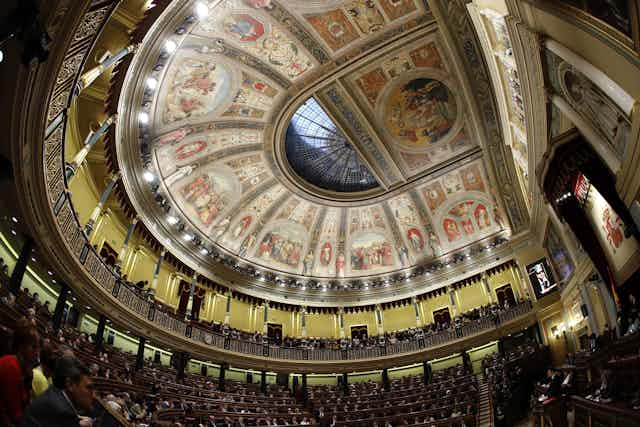On May 15 2011, Spain made worldwide headlines after a huge number of people spontaneously mobilised against mainstream politicians. During a deep recession, the indignados (indignant) movement sprang up with no connection to traditional political parties. The most widely repeated motto: “They don’t represent us”.
Protesters were referring to the two main political parties which had exchanged power during since Spain became a democracy in 1982: the conservative People’s Party (PP) and the social democratic Spanish Socialist Workers’ Party (PSOE).
The parties were considered the main culprits of the suffering caused by austerity policies and cutbacks in the welfare state. Just that month, the parties won 18 million votes between them in the national election and backed the severe adjustments demanded by a European Union which, at the time, only protected creditor nations’ interests.
Cut to the most recent election, held on 20 December 2015, and the electoral base of the major parties has nearly halved, with only 12 million Spaniards still supporting one or the other. Sitting prime minister Mariano Rajoy’s People’s Party lost its majority but won the most seats, while the PSOE polled its worst results ever but maintained its second position.
More than two months later, Spain still does not have a government.
Spain searches for a coalition
The leftist newcomer Podemos (We Can), whose origins are connected to the indignados movement and which obtained a similar number of votes to the PSOE, ranked third in the December. Far behind the top three, another new party, Ciudadanos (Citizens), came fourth. Its anti-nationalist centre-left position focuses on defending the unity of Spain – that is, preventing Catalonia from gaining independence – and has evolved towards the centre-right with a liberal vision of the economy.
This unprecedented situation in Spain’s parliamentary democracy has forced the main players to search for coalitions in order to form a new government, a common procedure in many other European democracies but a process foreign to Spain.
Forming what could be the first coalition government in the history of Spain’s democracy is not proving to be an easy task. This is primarily due to Rajoy’s inability to find partners to govern with.
Although a large coalition between the two main parties is the favourite option for Spain’s elites, including the leading communication groups, big companies and even previous PSOE leaders, it is the least popular scenario among Spaniards. Above all, it is the most widely rejected among those who didn’t vote for the People’s Party.
Whose recovery?
Why don’t any parties want to form part government with Rajoy?
Despite macroeconomic data hinting at economic recovery and the creation of jobs in Spain, the majority of the population is still feeling the economic crisis. Spain has some of the highest levels of inequality in the eurozone.
Poverty linked to joblessness has particularly impacted the young, most of whom think their standard of living will be lower than their parents’. The new jobs being created in Spain following the last labour reform are extremely precarious.
In addition to structural unemployment, with 20% of all Spaniards and 45% of those under 25 unemployed, the lives of the employed have become precarious: they work longer hours for lower salaries and have no bargaining power to improve their working conditions.
Corruption
Corruption scandals in the People’s Party have become another major issue in Spain. Concern about corruption was residual (under 10%) until January 2013, when it spiralled to 43%, coinciding with the publication of handwritten accounts by Luis Bárcenas, the former PP treasurer.
The documents demonstrated that the party kept a parallel bookkeeping system for illegal donations and paid bonuses to most of the senior members of the party in sealed envelopes, including Rajoy. The former treasurer was found to have up to €48 million in a Swiss bank account.
In the past month, the People’s Party has been accused of destroying evidence. Bárcenas’s computer was destroyed. People’s Party leaders had to resign in Madrid and Valencia, the two autonomous communities where the PP had the most support and the highest number of corruption scandals.
Running out of options
Nor is it easy for Socialist Party leader Pedro Sánchez to head a coalition government. He has only two options without the PP’s support: a coalition government formed by leftist parties with the abstention of the nationalist parties, or a central-right government.
PSOE’s leadership was in favour of the latter option. Sánchez accepted his party’s mandate and failed in his most recent bid to form government, as he was only supported by Ciudadanos. Negotiations to see if a leftist government can be formed with the support of the nationalist parties will be held in the next two months. If these attempts are unsuccessful and the PSOE fulfils its commitment not to form government with the People’s Party, elections will be held again on 26 June.
The need to find a solution to fit Catalonia into Spain will come up again during these negotiation. A PSOE-Podemos pact could only be formed with the abstention of the Catalonian independent parties.
Unfortunately for Spain, in the event that elections are held again, surveys of the post election scenario predict that the situation will remain every bit as complicated as it is now.

